Model Predictive Control of water resources systems: A review and research agenda
Abstract
Model Predictive Control (MPC) has recently gained increasing interest in the adaptive management of water resources systems due to its capability of incorporating disturbance forecasts into real-time optimal control problems. Yet, related literature is scattered with heterogeneous applications, case-specific problem settings, and results that are hardly generalized and transferable across systems. Here, we systematically review 149 peer-reviewed journal articles published over the last 25 years on MPC applied to water reservoirs, open channels, and urban water networks to identify common trends and open challenges in research and practice. The three water systems we consider are inter-connected, multi-purpose and multi-scale dynamical systems affected by multiple hydro-climatic uncertainties and evolving socioeconomic factors. Our review first identifies four main challenges currently limiting most MPC applications in the water domain: (i) lack of systematic benchmarking of MPC with respect to other control methods; (ii) lack of assessment of the impact of uncertainties on the model-based control; (iii) limited analysis of the impact of diverse forecast types, resolutions, and prediction horizons; (iv) under-consideration of the multi-objective nature of most water resources systems. We then argue that future MPC applications in water resources systems should focus on addressing these four challenges as key priorities for future developments.

 求助内容:
求助内容: 应助结果提醒方式:
应助结果提醒方式:


